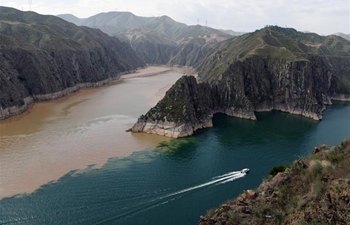by Cristobal Chavez Bravo
SANTIAGO, June 2 (Xinhua) -- Chile hopes to nudge countries from talk to action on climate change when it host a major international gathering on global warming later this year.
"The time for negotiating is over. We need to get to the pledged climate action and make the world a carbon-neutral place before the year 2050," Chilean Environment Minister Carolina Schmidt told Xinhua before the 25th session of the Conference of the Parties (COP25) to the United Nations Framework Convention on Climate Change (UNFCCC), which will be held in Chile's capital Santiago from Dec. 2 to 13.
As president of the COP25, Schmidt said "world leaders have to understand that we need to consider the urgency of climate action," before the damage is irreversible.
"Today we are facing a crisis situation in facing climate change. The commitments countries made through the Paris Agreement are not enough to limit temperature rise to 1.5 degrees Celsius, that's why it is essential to make the change from negotiation to collaboration on effective climate action," said Schmidt.
The Santiago Climate Change Conference "will be the COP of action, and our work and pledge is to significantly increase the means of implementing climate action -- financing means, the transfer of capacities, and the transfer of technology that are fundamental to making progress," said Schmidt.
Effective climate action requires not just the commitment of governments, but also of the private sector and other non-state agents, which "are going to lead the innovation needed to swiftly advance in this transformation," said the minister.
Chile's agenda will champion the protection of the oceans and Antarctica, electric mobility, renewable energy, and the safeguarding of forests, ecosystems and biodiversity, as well as the circular economy, a system that contrasts with today's disposable economy, minimizing waste and maximizing recycling.
Schmidt also confirmed that China will help to promote electric mobility by donating the electric buses to be used during the world's biggest environmental forum.
"We want to make the COP25 the COP of electric mobility," she said.
Santiago is already a showcase of electric mobility, with a public transit fleet of some 200 Chinese-made electric buses in service since December. Chilean President Sebastian Pinera has pledged to convert 100 percent of the country's public transit system to electric by 2040.
"China and Chile share a history of collaborating to improve the quality of life of our citizens," said Schmidt.
Non-polluting mass transit will be key to global sustainable development, Schmidt said, especially as more and more people are moving to cities.
"That is a fundamental pillar of the transformation that we need to make" to reverse global warming, she said.
With the world's largest copper and lithium deposits, Chile is also looking to clean up mining, one of its main productive sectors, said Schmidt, adding that the country was chosen the best country in the world for investing in renewable energy thanks to its natural characteristics.
"We have the world's most arid desert, the best for radiating and generating solar energy. We also have strong winds, and our descending rivers are ideal for producing hydroelectric energy," she said.
Government statistics show Chile went from producing one percent of its energy needs from renewable sources in 2010 to producing more than 20 percent in 2019.












